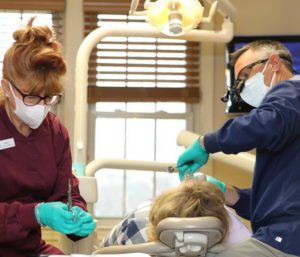COMMUNICATION IS EVERYTHING – PART 1
November 29, 2023
 Patients see things differently than dentists. Often, what is important to dentists is not important to patients and vice versa. This seems like the hysterical discovery of the obvious, but dentists often have a blind spot when it comes to seeing things from a patient’s viewpoint.
Patients see things differently than dentists. Often, what is important to dentists is not important to patients and vice versa. This seems like the hysterical discovery of the obvious, but dentists often have a blind spot when it comes to seeing things from a patient’s viewpoint.
We often have a similar blind spot in our ability to communicate with patients. When asked to rate their ability to communicate with patients, 60% of physicians rated themselves in the top 10%.
Dentists would probably have similar results.
Communication is key to any relationship. Why then do healthcare professionals, dentists specifically, often have poor communication skills with their patients? There is no one answer to this question, but we (dentists) all struggle with communicating with patients at some level.
Dentists often get a bad rap – in the media, interpersonally, and even in the movies. We (dentists) are often starting with a disadvantage in the relationship with our patients. Some patients, who may really need and want care, have preconceived notions such as fear without basis, an unpleasant past experience, or the idea that they just can’t afford it. It is more difficult to build a trusting relationship in these situations. Of course, there are many patients who love their dental office, but there are still even many of those patients who dentists have trouble communicating with.
I think the biggest problem we (dentists) have in many of these communication issues is time. Dentistry is a business, and an expensive business to run efficiently. When time is money, dental income to support the business comes from work being done in the chair. This creates yet another blind spot for the dentist.
Dentists may be great tooth fixers but in general are poor communicators. Anyone can drill on a tooth but not everyone has meaningful communication skills. When was the last time a dentist sat down with you for an extended conversation to discuss your personal situation, the importance and relevance to getting good dental care and its significance to systemic health? When was the last time a dentist helped you work through your particular barrier (fear, money, time, lack of concern, trust) to getting a healthier mouth? I know I have room for improvement.
Meaningful communication skills come more easily to some than others. For most of us, it seems it is always work in progress. I’m sure you can think of numerous past experiences of poor communication and realize later how the situation could have been better handled. I can think of many. Our way of communicating is often engrained in us. If we wish to improve our communication skills, we (dentists and everyone) must first become aware or more mindful of these interactions. Only then can we work on improving this skill. That takes time, and time is again a factor.
Dentists need to recognize, fully understand and be able to manage the different barriers that prevent patients from getting the care they deserve. Every patient has their own issues, their own concerns, their own personality and their own true or false notions about dentists and dentistry.
Relationships take time to develop. Talk with your dentist about anything that is holding you back from improving your dental health. These conversations build trust. Trust is the key factor in the dentist-patient relationship.
….to be continued
Dr. St. Clair maintains a private dental practice in Rowley and Newburyport dedicated to health-centered family dentistry. If there are certain topics you would like to see written about or questions you have please email them to him at jpstclair@stclairdmd.com. You can view all previously written columns at www.jpeterstclairdentistry.com/blog.
DON’T WORRY, BE HAPPY!
November 25, 2023
 I hope you had a wonderful Thanksgiving with family and friends! While we may be giving thanks for the many blessings in our lives, we also often need to battle the stressors.
I hope you had a wonderful Thanksgiving with family and friends! While we may be giving thanks for the many blessings in our lives, we also often need to battle the stressors.
This time of year always seems more stressful, but stress in general is hard to avoid. We worry about school, work, finances, illness, children, relationships, and more. Some even worry about how much they worry. Not to add to your stress, but you should be aware that all that worrying could have a negative impact on not only your general health, but also your oral health.
According to an article in the Journal of Periodontology, there is a strong relationship between stress and periodontal disease (gum disease). In addition to stress, other psychological factors, such as anxiety, depression, and loneliness are linked to an increased likelihood of periodontal disease.
So how does stressing out about your next car payment, for example, lead to gum disease? Researchers believe that the hormone cortisol may be a factor. Cortisol , also known as the “stress hormone,” is secreted by the adrenal glands and involved in many functions, including proper glucose metabolism, blood pressure regulation, insulin release for blood sugar maintenance, immune function, and inflammatory response. An earlier study published in the same journal the year before found that increased levels of cortisol can lead to more destruction of the gums and bone due to periodontal diseases.
Behavioral factors also may come into play. People who are under extreme amounts of stress or suffering from depression may be more likely to disregard good oral hygiene. They may even take on new behaviors that could negatively impact their oral health, such as the use of nicotine, alcohol, or drugs, all of which can affect the teeth and gums.
Your gums are not the only victims of stress. Another oral side effect is teeth grinding or clenching, which often occurs during sleep. This may lead to headaches, earaches, or toothaches. Facial muscles can become sore and jaw joints tender. Besides causing discomfort, grinding and/or clenching can lead to severe tooth wear, loosening of teeth, and cracked or fractured teeth.
It is important to find healthy things that help relieve stress. A regular exercise routine can do wonders for relieving stress, as well as having a balanced nutritious diet and getting enough sleep. You should be getting 7-8 hours of good sleep every night. If you are not getting that amount, you are depriving yourself of optimal performance.
If you find it difficult to manage your stress, you should see your physician. Stress cannot be avoided, but it can be managed and minimized by change. You should also make your dentist aware of your stress level so that he/she can determine if there are any notable effects going on within your masticatory system and make recommendations to help.
Dr. St. Clair maintains a private dental practice in Rowley and Newburyport dedicated to health-centered family dentistry. If there are certain topics you would like to see written about or questions you have please email them to him at jpstclair@stclairdmd.com. You can view all previously written columns at www.jpeterstclairdentistry.com/blog.
THE FINAL PUSH!
November 15, 2023
 November is almost over! It’s crunch time to get everything done that we haven’t gotten done during the rest of the year. For those with remaining dental benefits, it’s also the time of year to consider utilizing those so you don’t lose them.
November is almost over! It’s crunch time to get everything done that we haven’t gotten done during the rest of the year. For those with remaining dental benefits, it’s also the time of year to consider utilizing those so you don’t lose them.
Unused dental benefits go directly back to the insurance company, which generates hundreds and hundreds of thousands of dollars for the insurance companies each year. Dental insurance companies count on the fact that many people will not claim their $1000 or so in benefits by the end of the calendar year. Those with dental benefits should look for legitimate means to use these benefits before they are lost.
For example, perhaps a crown has been recommended by your dentist, but you have procrastinated about it. It would make sense to consider using those dental benefits before the end of the calendar year. This allows a whole new round of dental benefits to be used for unexpected dental needs the following year, and maximizes the value of the premiums paid.
Remember, insurance companies are in the business to make money. They don’t want you to use your dental benefits. If the balance (co-payment) you will owe for the dental work that needs to be done is too much for you, consider financing options through your dental office. Most dental offices offer interest-free financing to patients for up to 12 months. Financing your balance in this way may make more financial sense than throwing money away to fund the insurance company’s pocketbooks.
Another thing to consider as the end of the year approaches is the use of flex spending accounts. Many employers now offer pre-tax flex spending accounts for healthcare expenses. Often underutilized, these are excellent mechanisms for saving about 20 percent on needed dental care. If you are paying for your dental insurance premiums, it may even make sense to fund an available flex spending account with that premium money instead of, or in conjunction with it.
For instance, if you are anticipating the need for $3000 in dental care, opting to place the $3000 in a flex spending account can save the income tax on those monies and can usually be used as soon as January 1st. If you have money left in a flex spending account, remember to check with your employer to determine if that money needs to be used by the end of the year. You don’t want to lose that money either.
As you begin to make financial decisions for the end of this year and for the upcoming year, consider a discussion with your dental office’s financial person. They are often an untapped wealth of information and can usually thoroughly and knowledgeably discuss your dental financial options with you.
And, don’t wait too long. Dental office schedules get full quickly this time of year with patients trying to use dental insurance benefits and unused flex account money. Maximize your hard-earned dollars.
Dr. St. Clair maintains a private dental practice in Rowley and Newburyport dedicated to health-centered family dentistry. If there are certain topics you would like to see written about or questions you have please email them to him at jpstclair@stclairdmd.com. You can view all previously written columns at www.jpeterstclairdentistry.com/blog.
REPLACEMENT PARTS
November 13, 2023
 It seems I have more and more patients telling me about their upcoming shoulder, hip, and knee replacement surgery. There are other parts that people have replaced, but those are the top three. Most of these people decide to go under the knife to improve their quality of life.
It seems I have more and more patients telling me about their upcoming shoulder, hip, and knee replacement surgery. There are other parts that people have replaced, but those are the top three. Most of these people decide to go under the knife to improve their quality of life.
If you were born in the Paleolithic era, you could expect to live to 33 years old. The average global life expectancy in 2010 was more than double this number at 67 years. The main reasons for this are advances in hygiene, food production, and medical care.
On the bright side, if you were born in the Paleolithic era, you would most likely never need a hip replacement. It usually takes longer than 33 years to wear out the joint.
Today, about 2.3% of Americans have had a hip replaced and 4.6% have had a knee replaced. More than a million joint replacements will be done this year and the number continues to grow. The longer we live, the more chance we have of parts needing replacement.
What about teeth? Your lower first permanent molars erupted into your mouth around the age of 6 years old. If you are 50 years old, these teeth have been tolerating chewing, hot coffee, cold ice cream, the occasional popcorn kernel, and maybe even grinding back and forth for 44 years. You have used them every day for 44 years!
What else can you use that much for 44 years that doesn’t require some kind of maintenance? How about that car you drive every day? The car certainly requires maintenance to function properly. The oil needs to be changed on a regular basis. Depending on several factors, the tires need to be rotated to wear evenly and usually need to be replaced after so many miles. I don’t know too many people who drive the same car for 44 years.
Of course, I am not insinuating that everyone needs replacement teeth at some point. I am saying that it is naïve to think that a car, a furnace, a computer, or your teeth will run forever without maintenance, and that they will run better with routine maintenance.
What happens if you don’t do regular maintenance on your car? It will run for a long time, at some point its performance will decrease, and then when it finally decides to quit, it will be catastrophic. You will have to replace your car. How much will it cost to replace your car? Doesn’t it make sense to keep up with the routine maintenance?
Sometimes, even with regular maintenance, parts need to be repaired or replaced. We often have to make a decision on “how” to fix something. Do we patch it up to get some more miles out of it or do we replace the part to extend the serviceability? It may depend on the cost. It may also depend on the risk of the patch failing. You may decide that the risk is too high and go ahead and replace the part, even though it may cost more.
If you were a caveman, we wouldn’t be discussing this. You wouldn’t have a car and most of your own “parts” would make it to your expected 33 years….but you’re not a caveman. You are likely to wear parts out. You may need a hip replacement, or a filling, or a crown.
And remember: Just like regular oil changes and maintenance will help your car run well much longer, regular professional dental maintenance will help keep your pearly whites functioning at peak performance.
Dr. St. Clair maintains a private dental practice in Rowley dedicated to health-centered family dentistry. He has a special interest in treating snoring, sleep apnea and TMJ problems. If there are certain topics you would like to see written about or questions you have please email them to him at jpstclair@stclairdmd.com
Keep Red Wine from Staining Your Teeth This Holiday Season with These Tips
November 10, 2023

Red wine is an ancient beverage that is used in celebrations across the world. It’s known for its robust, fruity flavor, its dark color, and how it pairs amazingly well with red meat, making it an excellent way to commemorate a holiday. However, it is also notorious for its ability to stain or discolor teeth. Luckily, there are measures you can take to prevent that from happening as well as dental treatments that can undo the damage. Here are a few tips to follow at your next holiday gathering to avoid having a purplish smile afterward.
HOW OFTEN SHOULD YOU VISIT A DENTIST?
November 6, 2023
 Despite the generalized notion that people should visit a dentist bi-annually, I am more a proponent of individualized frequency recommendations based on a few factors. We are not all the same; therefore, each of us has our own specific needs.
Despite the generalized notion that people should visit a dentist bi-annually, I am more a proponent of individualized frequency recommendations based on a few factors. We are not all the same; therefore, each of us has our own specific needs.
Results from a recent Gallup-Healthways poll of 355,334 Americans indicate that more than one-third of the population, 34% to be exact, did not visit a dentist last year at all. Over 50% of the population said they visited the dentist one time or less last year.
In a study reported in The New York Times and other major media, a report by the Journal of Dental Research indicates “little evidence supports biannual preventive care for all adults.” Similarly, the headline from HealthDay News read, “Annual Dental Cleaning May be Enough for Some.”
The researchers explored the association between long-term tooth loss and the frequency of preventive dental visits in adults with and without three risk factors for periodontal disease: smoking, diabetes and interleukin-1 genetic variations (regulates immune and inflammatory responses). Subjects were deemed low risk if they had none of these factors.
The data showed that as a group the high-risk patients who had two preventive dental visits lost significantly fewer teeth compared to the high-risk group that had only one preventive dental visit per year. By contrast, there was no difference in tooth loss for the groups at low-risk based on one versus two preventive visits per year. The researchers concluded that individual risk factors should dictate the frequency of cleanings.
The American Dental Association recommends regular dental visits at an interval determined by the patient’s dentist. The patient’s dentist makes an individualized recommendation based on the patient’s health history and current oral health status.
Here are some points that may help you understand the study and the importance of personalized care:
- The key takeaway from this study is that personalized oral care—taking into account your oral and overall health history—is necessary for good dental health.
- The study only looked at tooth extraction and its association with risk factors for gum disease; however, other health conditions can contribute to poor oral health. That’s why personalized dental care is critical to good patient care.
- Personalized treatment plans should be the priority. Recommendations for future dental appointments should be based on what is seen during your examination, your health history, and any concerns you may have about your oral health.
- The American Dental Association’s website at www.mouthhealthy.org has a lot of information on how to take care of your oral health between dental visits.
While there is clearly a segment of the population who can “get away” with visiting a dentist once a year to maintain a healthy mouth, this group is relatively small. 75% of the population has some form of gingivitis or periodontal (gum) disease. Within that group, there are those who should see a dentist/hygienist twice per year, some three times and others four times or more to maintain proper health.
It is up to you and your dentist to have an open conversation about how often you should go. If it has been a while, getting there the first time is step number one.
Dr. St. Clair maintains a private dental practice in Rowley dedicated to health-centered family dentistry. He has a special interest in treating snoring, sleep apnea and TMJ problems. If there are certain topics you would like to see written about or questions you have please email them to him at jpstclair@stclairdmd.com







